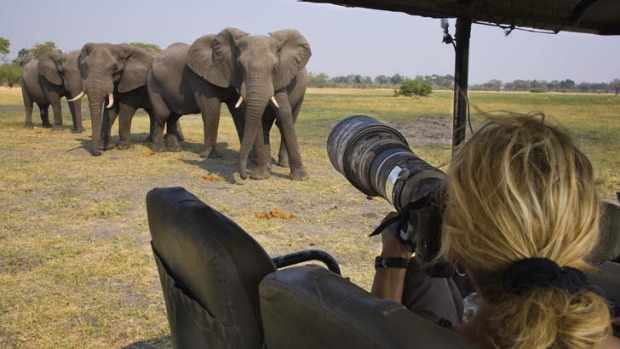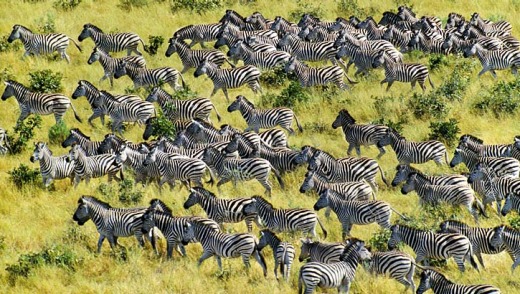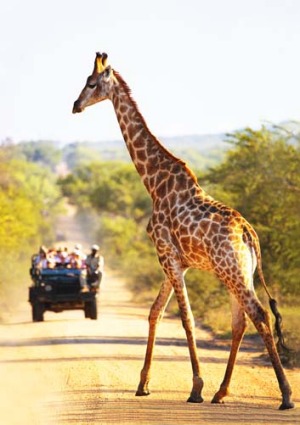
It's game on for an unforgettable adventure, writes Katrina Lobley in this first-timers' safari guide.
The urge to go on safari strikes me suddenly and unexpectedly, in the way some people fall head over heels in love. Out of the blue - maybe it's a mid-40s thing - I want to see Africa's animals roaming the land under huge skies instead of behind bars in a zoo.
Almost as soon as I think it, I'm booked on a Botswana safari. I borrow Alexander McCall Smith novels from the library, hoping to understand Botswana, but I'm just delaying what's really stopped me going to Africa all these years: vaccinations. For I have a needle phobia bigger than a herd of African elephants.

THE JABS
No vaccinations are compulsory for Botswana but, because I'm detouring into Zambia post-safari, I need a yellow fever shot to re-enter South Africa on the way home. Damn. For this, not all medical centres are equal - you need one that's yellow fever-accredited.
The doctor reels off a recommended vaccination schedule - the possible diseases blur into one as blood drains from my face. The doctor jokes, "Why do you want to travel to Africa anyway?"

At this point, I can't remember.
I take tetanus along with yellow fever - the tetanus shot hurts, yellow fever doesn't.
I'm also prescribed the anti-malarial Malarone (my fellow safari-goers from England and Canada are taking these tablets too). The doc warns they're expensive but I still reel when the pharmacist announces 24 tablets will cost $128. This safari better be worth it.
THE EQUIPMENT
This once-in-a-lifetime trip prompts a reassessment of my camera. I'm unhappy with its 5x zoom and search, "best zoom on a point-and-shoot". The Canon SX50HS, with a 50x zoom, induces zoom-envy from fellow safari-goers: it's particularly brilliant for capturing birds in far-off branches. A few days after visiting the camera store, I return for a spare battery because I'm unsure if our remote camps can recharge them (turns out they can but it's reassuring to have the spare).
THE OUTFIT
There's a certain type of safari-goer who kits him or herself out in top-to-toe khaki - the only thing missing is the pith helmet. At the other end of the scale, backpackers happily tour Chobe National Park looking like they've bounced straight from a nightclub: they're not too worried about scaring animals with their fluorescent sunglasses and skimpy threads. Remember you'll be sitting for many hours in a safari vehicle rather than walking around (which is dangerous), so running shoes are fine. Pack loose, comfortable clothes, including a long-sleeved shirt and wide-brimmed hat to fend off harsh rays angling in from the side of the vehicle.
THE ITINERARY
AndBeyond's 10-day Explorer Expedition safari starts in Maun, Botswana, near the wildlife-rich Okavango Delta - an inland delta that sprawls over 16,000 square kilometres as it empties into the Kalahari Desert. Safari-goers continue to Chobe National Park in the country's north-eastern corner before finishing in neighbouring Zimbabwe. I'm doing a potted highlights bespoke itinerary - two nights in the delta and two in the national park.
THE SEASONS
Dry winter months - from May to August - are considered Botswana's best game-viewing months, along with September and October, when animals congregate near water. We head to the delta at the end of summer when the grass is long and lush and animal-spotting is supposedly difficult.
Within an hour of arriving, we're tracking lion prints on a sandy road. Soon, furry ears pop above the grass. It's all we can do to not squeal like schoolkids. It's not only a surreal sight but a total adrenalin rush.
We calm down and park just metres from the pride of six lions lazing in the shade of a feverberry tree. A smear of blood on a cheek tells us they've just eaten. They laze with full stomachs, rolling on their backs like super-sized domestic kitties.
"This is one of the top experiences, to see them like this," whispers our guide, Chief Marota.
We realise life in Africa is gloriously unpredictable and wonder what could top this.
OKAVANGO DELTA
While Chief drives, tracker Kux Mobe keeps his eyes peeled for animals and birds from a seat precariously perched above a headlight. In the delta, vehicles can go off-road so we veer off over grasslands to pull closer to a dazzle of zebras and a journey of giraffes. I adore these collective nouns and the thrill of spotting something new. Field guides in the vehicle tell us more about these exotic creatures. One of my favourite sights is two adorable spotted hyena cubs playing near their den while mum is off finding dinner.
The birds - a pretty lilac-breasted roller perched in a leadwood tree, a woodland kingfisher flitting from a sausage tree and a large saddle-billed stork high-stepping through a marsh - are enthralling.
Tall termite mounds play a pivotal role in the delta, attracting animals whose droppings contain seeds that then sprout, helping to form small islands. "If we didn't have termite mounds, the delta would be a very big lake," says Chief.
CHOBE NATIONAL PARK
Unlike the delta, Chobe National Park is a strictly on-road experience - but that doesn't detract from game-viewing. The park, divided from neighbouring Namibia by the Chobe River, is so packed with wildlife that there's always another thrilling encounter just around the corner.
The world's largest elephant herd - estimated to number more than 120,000 - roams northern Botswana including Chobe (billboards around Kasane, the nearest town, describe the park as "the land of giants"). You may even - gasp - grow tired of the sight of elephant and impala, our most oft-spotted species. Our safari includes a river cruise past elephants frolicking in the water.
Back on land, we're riveted by more giraffes, a lone hyena and a pair of industrious dung beetles rolling a dung ball - many times bigger than them - along the road.
THE WATERWAYS
In the delta, we board a flat-bottomed boat to cruise into a maze of narrow, papyrus-shaded channels that's all very Indiana Jones and take morning tea among the waterlilies.
"If you follow this channel, you get to Angola," says Kux.
Chief scoops up the water in a bottle to show its clarity - it looks perfect, but foreigners of course can't drink it. Later, we're poled along in canoes known as makoro and sit riveted, listening to grunts, hoots and calls as the day darkens.
At Chobe National Park, cruising the hippo-laden river separating Botswana from Namibia is a highlight. Along the riverbank herds of elephant are at play, spraying mud and water, drinking and swimming. Crocodiles bask in the sunshine.
LIFE AT CAMP
At the Nxabega delta camp, the camp cook, Priscillah, welcomes us with ululations so thrilling I wish I'd recorded them so I could channel Africa on demand. The unfenced camp overlooks a marsh favoured by red lechwe - an antelope that has adapted to live in swamps.
One afternoon I emerge from my tent to startle something just metres away. I'm left wondering what scampered off into the grass - a warthog, maybe?
Because anything could wander through the campsite, we're fetched from our tents for dinner even though it's only a short walk to the lantern-ringed table.
We might be in the middle of nowhere but the menu is gourmet: chickpea soup, roasted bream fillet with baby potatoes, carrots and beans for mains and panna cotta to finish. Another day we lunch on eggplant and spinach bake, rice, beef with almonds and capsicum salad and bread.
Tents contain a full-size bed and side tables holding an emergency horn, lamps and two types of insect repellent. Between the sleeping and toilet tents is an open-air bathroom - staff fill the bucket shower with warm water in the morning (their arrival doubles as a wake-up call). There's also a dressing table with a mirror, toiletries, tub and some detergent.
TOILETS
For those worried about such things, here's the lowdown on toilets. At the camps, each sleeping tent is paired to a toilet tent with a flushable porcelain loo that wouldn't disappoint the most high-maintenance safari-goer. If the urge strikes on a game drive, you may have to go behind a bush (once a guide has checked for lurking lions) or behind the vehicle. Believe me, no one cares.
WHAT I'D PACK NEXT TIME
All that sitting and bouncing around in the Toyota can induce a condition known as "LandRover back". Next time, I'd take a yoga mat to do some serious stretching at camp between game drives.
WHAT I TELL FRIENDS
Wildlife tourism is big in Botswana's economy, so not surprisingly the safari is like a well-oiled machine. The only thing to worry about is what amazing sight is next. I can't wait to return, even if it means more jabs.